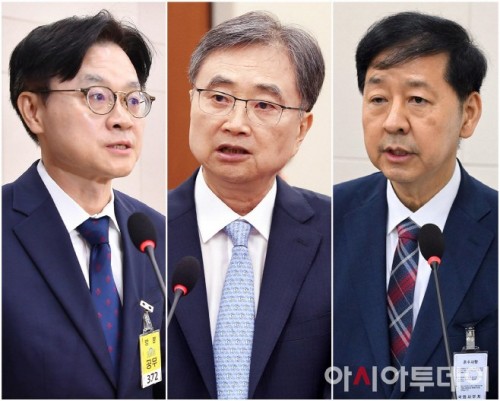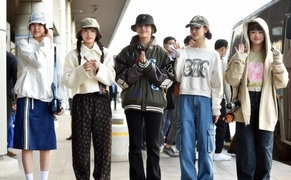 |
| From left, Minister of Trade, Industry and Energy Kim Jung-kwan, Foreign Minister Cho Hyun, and Deputy Prime Minister Koo Yoon-cheol attend a high-level strategy meeting on U.S. tariff negotiations at the presidential office in Yongsan, Seoul. / Photo: Song Ui-joo |
With just five days remaining until the United States imposes a 25% reciprocal tariff on South Korean imports, high-level negotiations between the two countries are accelerating. The South Korean government has mobilized its top economic, trade, and diplomatic officials—nicknamed the "K-avengers"—in a last-minute push to secure a breakthrough.
Deputy Prime Minister and Finance Minister Koo Yoon-cheol is set to meet with his U.S. counterpart, Treasury Secretary Scott Besant, later this week. Foreign Minister Cho Hyun will also hold separate talks with Secretary of State Marco Rubio. Meanwhile, Trade Minister Kim Jung-kwan and Chief Trade Negotiator Yeo Han-koo are already on the ground in Washington for behind-the-scenes negotiations.
President Lee Jae-myung has remained closely engaged, receiving real-time updates through a “24-hour channel.” Over the weekend, National Security Director Wi Sung-rak and Policy Chief Kim Yong-bum convened an emergency meeting to finalize negotiation strategies centered on “national interest.” “We are fully committed to concluding the talks before August 1,” said the presidential office.
On July 26, a major coordination meeting was held at the presidential office in Yongsan, with ministers and vice ministers from key departments in attendance, including Koo and Cho. Presidential aides such as Economic Advisor Ha Joon-kyung and National Security Deputy Director Oh Hyun-joo also participated, with Washington-based officials joining via video link.
The Korean side plans to leverage its globally competitive shipbuilding industry—an area where U.S. demand aligns with Korean strength—as a strategic card in the negotiations. “We have confirmed strong U.S. interest in shipbuilding cooperation,” said a presidential spokesperson. “We will work to establish a mutually acceptable agreement, including collaboration in this sector.”
This direction was based on a high-level meeting held on July 24 in Washington, D.C., between Trade Minister Kim and U.S. Secretary of Commerce Howard Lutnick. President Donald Trump has repeatedly emphasized rebuilding U.S. shipbuilding capabilities and sought Korean support. Policy Chief Kim added, “We expect a positive response from the U.S. to our revised proposals.”
Timing is critical. Several countries—including Japan, the UK, Vietnam, Indonesia, and the Philippines—have already concluded similar talks with the U.S., increasing pressure on Seoul to reach an agreement before the August 1 deadline. Many observers believe the decisive moment will come on July 31, when a dramatic face-to-face resolution is likely.
Public opinion is also a sensitive factor. Japan negotiated its tariff rate down by 10 percentage points from the original 25%, and failing to achieve a better or equal outcome could trigger domestic backlash. “This issue goes beyond political divisions—it’s a matter of national interest,” said a senior government official. “We hope the public will unite behind us, just as they would for Korea’s national soccer team. Instead of worrying about injuries or gaps in the lineup, let’s stand together.”
Most Read
-
1
-
2
-
3
-
4
-
5
-
6
-
7





















